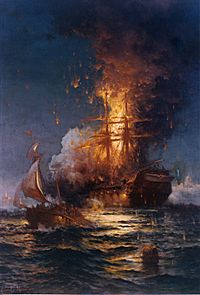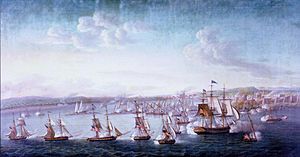Barbary Wars facts for kids
Quick facts for kids Barbary Wars |
|||||||
|---|---|---|---|---|---|---|---|
 USS Philadelphia burning at the Battle of Tripoli Harbor during the First Barbary War in 1804 |
|||||||
|
|||||||
| Belligerents | |||||||
|
|
|||||||
| Commanders and leaders | |||||||
|
|
||||||
The Barbary Wars were two conflicts fought by the United States, Sweden, and the Kingdom of Sicily. They fought against the Barbary states in North Africa during the early 1800s. These states included Tunis, Algiers, Tripoli, and Morocco. Sweden had already been fighting Tripoli since 1800. The newly independent United States joined the fight.
The First Barbary War lasted from May 10, 1801, to June 10, 1805. The Second Barbary War was much shorter, lasting only three days, from June 17 to June 19, 1815.
These wars happened because of piracy by the Barbary states. For centuries, pirates from North Africa captured ships and raided towns across the Mediterranean Sea. By the 1800s, this activity had slowed down. However, Barbary pirates still demanded money, called tribute, from American merchant ships. If the US refused to pay, American ships and goods were captured. Often, the crew members were taken as prisoners or sold into slavery.
After Thomas Jefferson became US president in March 1801, he sent the US Navy to the Mediterranean. Their mission was to fight the Barbary pirates. The US fleet attacked many fortified cities in what is now Libya, Tunisia, and Algeria. This led to agreements that allowed American ships to travel safely. It also ended the first war.
During the War of 1812, the Barbary pirates started attacking American ships again. They were encouraged by the United Kingdom. After the War of 1812 ended, President James Madison (Jefferson's successor) sent US forces to fight the Barbary states again. This Second Barbary War quickly ended the need for the United States to pay tribute. It also gave the US full shipping rights in the Mediterranean Sea. This greatly reduced piracy in the area.
Contents
Understanding the Barbary Wars
Who Were the Barbary Pirates?
The Barbary pirates were also known as corsairs. They were pirates and privateers who operated from North Africa. Their main bases were the ports of Tunis, Tripoli, and Algiers. This region was known in Europe as the Barbary Coast. This name came from the Berbers, who were native people of the area.
These pirates attacked ships all over the Mediterranean Sea. They also sailed south along West Africa's coast and even to the eastern coast of South America. Sometimes, they went as far north as Iceland. Besides seizing ships, they raided European coastal towns. These raids mostly happened in Italy, France, Spain, and Portugal. But they also attacked places like England, Scotland, the Netherlands, and Ireland. The main goal of these attacks was to capture Europeans. They would then sell them in the slave market in North Africa.
The Barbary states were officially part of the Ottoman Empire. However, they mostly acted independently. The Ottoman government in Constantinople (modern-day Istanbul) usually did not get involved in their actions.
Why Did the Pirates Attack American Ships?
For a long time, the Barbary pirates attacked British ships. They held captives for ransom or enslaved them. During the American Revolutionary War, the pirates began attacking American ships too. However, on December 20, 1777, the Sultan of Morocco, Mohammed III, declared something important. He said that merchant ships from the new American nation would be safe in the Mediterranean. This was part of the Moroccan-American Treaty of Friendship. This treaty is America's oldest unbroken friendship treaty with another country.
After the American Revolution, the US no longer had the protection of the British navy. The Barbary pirates realized this. So, in the 1780s, they started seizing American ships again. At first, the US government agreed to pay tribute to stop the attacks. By 1797, the United States had paid a huge amount of money. It was about $1.25 million, which was a fifth of the government's yearly budget back then!
Many Americans were angry about these payments. They felt the money should be used to build a navy instead. A navy could protect American ships from pirate attacks. In the 1800 United States presidential election, Thomas Jefferson became president. He promised to stop the US from being "humiliated by paying an enormous tribute to the petty tyrant of Algiers."
The First Barbary War (1801–1805)
The First Barbary War is also known as the Tripolitan War. It was the first of two wars fought between the United States and the Barbary states. These states were Tripoli, Algiers, and briefly, Morocco. This war began when Thomas Jefferson became president. He refused to pay the increased tribute demanded by the Barbary states.
On May 13, 1801, a US naval fleet was sent to the region. It was led by Commodore Richard Dale. Other important officers included Stephen Decatur and William Bainbridge. Their ships included the USS Essex, USS Philadelphia, USS President, and USS Enterprise.
During this war, the ship USS Philadelphia was blocking Tripoli's harbor. It accidentally ran aground on a hidden reef. The ship came under fire from shore cannons and Tripolitan gunboats. Captain William Bainbridge tried to free the ship. He ordered all guns and heavy objects thrown overboard. But it was no use. The ship was captured, and its crew became prisoners and were enslaved.
To prevent the Barbary pirates from using this powerful warship, the Americans decided to destroy it. A small group of American Marines, soldiers, and allied sailors attacked the Philadelphia. They were led by Stephen Decatur. They successfully burned the ship, making it useless to the pirates. This daring act was a major event in the war.
The Second Barbary War (1815)
The Second Barbary War is also called the Algerine or Algerian War. It was the second conflict between the United States and the Barbary states. This war happened in 1815. The international dispute over piracy in the region was largely ended the next year by the United Kingdom and the Netherlands.
This war finally stopped the American practice of paying tribute to the pirate states. It also helped bring an end to widespread piracy in that region. For centuries, piracy had been common under Ottoman rule. But within a few decades, European powers built more advanced and expensive ships. The Barbary pirates could not compete with this new technology or the number of ships.
Impact in the United States
The US military's success against the pirates in the early 1800s was very important. It showed that the new nation could protect its interests. Many Americans felt proud that their presidents refused to pay tribute. They believed it was better to fight for freedom of the seas.
This success also led to the building of a stronger United States Navy. To protect American merchant ships, the US built its first six heavy frigates. These included the USS United States, USS Constitution, and USS Constellation. These ships were vital for protecting American trade and showing the world the strength of the young United States.
See also
- Algeria–United States relations
- Libya–United States relations
- Morocco–United States relations
- Ottoman Empire–United States relations
- Tunisia–United States relations
- Turkey–United States relations
 | Valerie Thomas |
 | Frederick McKinley Jones |
 | George Edward Alcorn Jr. |
 | Thomas Mensah |


